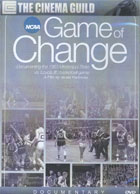
Game of Change 2008
Distributed by Cinema Guild, 115 West 30th Street, Suite 800, New York, NY 10001; 212-685-6242
Produced by Jerald Harkness
Directed by Jerald Harkness
DVD, color and b&w, 60 min.
Sr. High - Adult
African American Studies, American Studies, Civil Rights, History, Popular Culture, Sports
Date Entered: 05/29/2009
Reviewed by Brian Burns, Hampden-Sydney College, Hampden-Sydney, VirginiaThe 1966 NCAA men’s basketball championship game between Texas Western College (now U. of Texas El Paso) and the Adolf Rupp led University of Kentucky is well known in the annals of college basketball history as well as in civil rights history. Texas Western started five black players against Kentucky’s five white players. The Miners of Texas Western had no chance against mighty Kentucky, but nonetheless prevailed for a shocking championship. Not as well known, but no less important is the role of the 1963 Mississippi State Bulldogs and the circumstances surrounding their appearance in the NCAA basketball tournament, particularly the game against Loyola of Chicago that year. The remarkable story is told in Game of Change.
Mississippi State had a very good basketball team in the early 1960s and was able to overtake a dominant Kentucky team in the Southeastern Conference. For two consecutive years the Mississippi State Bulldogs earned the right to play in the NCAA tournament, and for two consecutive years, then governor Ross Barnett refused to allow the team to compete as there would be teams in the tournament that place negro players on the floor. No team from Mississippi was going to play against an integrated team. Barnett had been elected on a segregationist plank. Going into the 1963 season, Coach Babe McCarthy told his players that if they managed to win the SEC and qualify again, he would find a way to get them to play in the tournament. After all, they had earned the right to play. The Bulldogs won the SEC and Mississippi State President Dean Colvard risked his reputation and career to support his coach and his students.
Meanwhile the Loyola team was facing a different type of pressure. Starting four black players in 1963 was unique and a risky proposition, but they were going to put their best players on the floor regardless of race. The players had mounting pressure from both sides—from the whites they would hear “you better lose” and from the blacks “you better win.” They decided to play to win, and with the pressures forming a melding influence, they played well and made it to the NCAA tournament.
Good videography mixed with historical footage helps make this a quality film from a production standpoint. Interviews with many of those players as they remember the circumstances, brings the story home with a very personal touch. The saga is well told. The DVD lacks the typical main menu and has no bonus extras, but is still worth purchasing if your collection has some focus on civil rights issues or the role of sports in civil rights as well as African American studies and post-World War II America. Highly recommended.